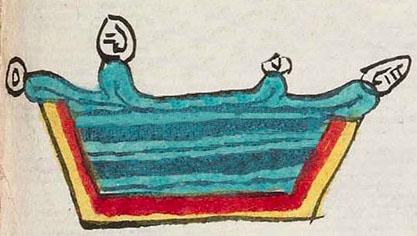apantli (Mdz50r)
This element of a canal (apantli) has been carved from the compound sign for the place name, Coapan (or Coaapan). It is a trapezoid with a red and yellow lining (more suggestive of construction than a natural shape) and turquoise blue water. The water has horizontal but wavy black lines of different thicknesses (suggestive of movement), and splashing off the top of the water are turbinate shells and water droplets. These are white, and they are emblematic in the iconography of water. We have digitally removed the coatl (serpent) from the water in the original compound hieroglyph, and therefore we had to reconstruct the water in place of the animal. See below, for the original.
Stephanie Wood
In the compound, this element played a phonetic role, but here we will just call it a logogram.
This element serves as a visual locative suffix for the place name, providing the reading "on the water"--apan, which is the stem for apantli. The lining of the canal can vary in the colors and number of layers, as shown in other examples, below.
Stephanie Wood
c. 1541, by 1553 at the latest
Stephanie Wood
water, shells, agua, conchas, construcción, canales

apan(tli), water channel or canal, https://nahuatl.wired-humanities.org/content/apantli
pan(tli), furrow, https://nahuatl.wired-humanities.org/content/pantli
-apan (locative suffix), on the water, https://nahuatl.wired-humanities.org/content/apan-0
a(tl), water, https://nahuatl.wired-humanities.org/content/atl
-pan (locative suffix), on, https://nahuatl.wired-humanities.org/content/pan
el canal, o la zanja con agua
Stephanie Wood
Codex Mendoza, folio 50 recto, https://digital.bodleian.ox.ac.uk/objects/2fea788e-2aa2-4f08-b6d9-648c00..., image 110 of 188.
The Bodleian Libraries, University of Oxford, hold the original manuscript, the MS. Arch. Selden. A. 1. This image is published here under the UK Creative Commons, “Attribution-NonCommercial-ShareAlike 3.0 License” (CC-BY-NC-SA 3.0).





